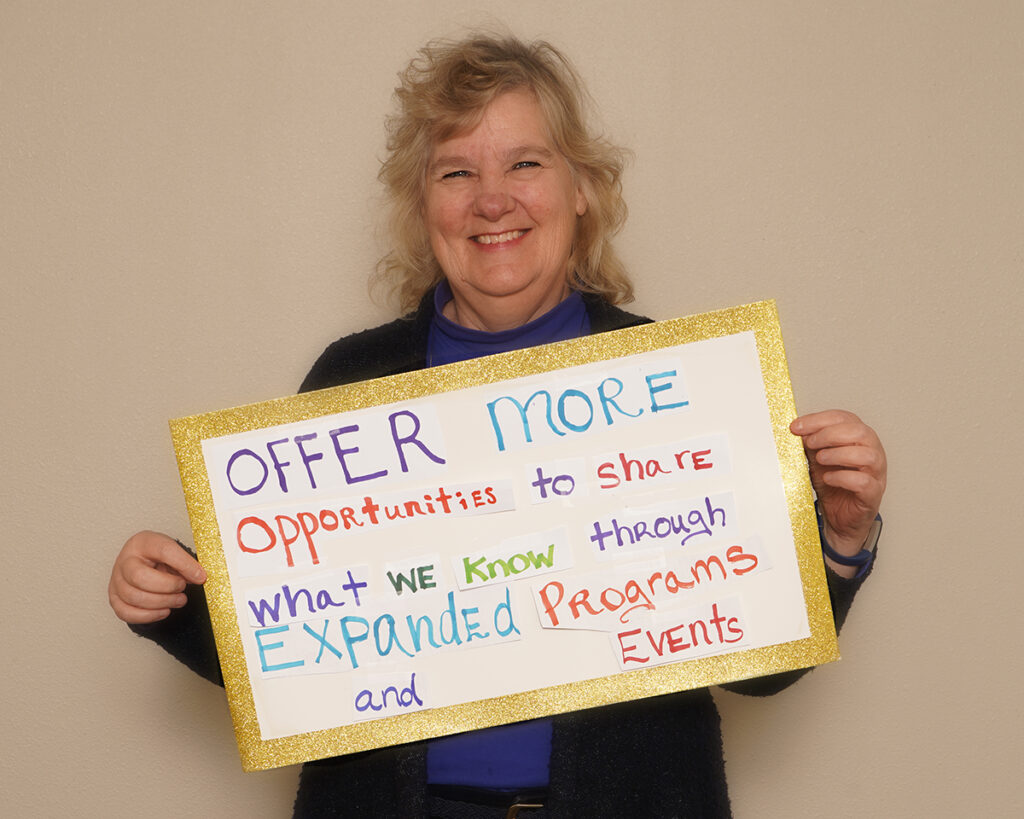Prairie Rivers of Iowa Executive Director Penny Brown Huber has established a culture of teamwork, insight, and encouragement for over a decade. “Her leadership as our executive director has helped create a uniquely talented staff who are working together in our important conservation work,” boasts board chair Reed Riskedahl. Huber has announced she will step down from her position as director on December 15, 2023. The announcement was met with a sense of loss among staff, the board of directors, our partners, and many of those we serve as an organization, but we are grateful for her leadership and wish her the best in her new endeavors. We have all benefited from her encouragement, guidance, and compassion. Thank you, Penny, for the thirteen incredible years of dedicated service to Prairie Rivers of Iowa!
I recently interviewed Huber about her tenure at Prairie Rivers. Here is what she had to say:
What drew you to accept the Prairie Rivers of Iowa executive director position? Did you have a particular passion that influenced your decision?
“I was aware of the excellent work the RC&Ds were doing around the state and respected what Prairie Rivers of Iowa was accomplishing. My passion for helping people and educating them on natural resources led me to want to accept the executive director position.”
What are two to three accomplishments accomplished during your tenure that you are the proudest of?
- “Continuing to build quality programs supported by science and employing talented and committed people to lead the way.”
- “Expanding the Prairie Rivers of Iowa brand to serve more people and Iowa’s natural and cultural resources.”
How do you feel your influence and management style have enabled the staff and board members to work at their best?
“Part of serving as an effective administrator is to work with our people where they are at in building their programs by supporting what they know and helping to move their projects, ideas, and opportunities forward. We cannot do our work alone, so looking for partners and supporters and building effective teams is ultimately how we get things done.”
What kind of shape is the work at Prairie Rivers of Iowa in compared to when you started?
“The organization has grown a lot both in capacity and resources. In the beginning, it was just our Office Manager Carman Rosburg, and me in the office working with the Board of Directors to lay out a strategic plan to move the organization forward. At that time, there was a group of projects that were not related to each other. Today, we have programs with extremely talented and smart people steering the way on improving water quality, pollinator conservation, and building a vibrant byway program for the Lincoln Highway National Heritage and Iowa Valley Scenic Byways.”
What are the most critical tasks or goals you see for Prairie Rivers as the organization moves forward?
Building program capacity to address local and statewide projects will open up opportunities for more partners, sponsors, and positive change. Bridging the educational efforts so that citizens become enthusiastic learners and supporters is a pathway to solving the very challenging problems in Iowa.
What would it be if you had to give one piece of advice to your replacement?
Make sure there is time to do strategic thinking both for the overall organization and with the program leaders. Enjoy communicating with a variety of people to really develop a sound understanding of problems and solutions. Creating positive change is about taking one step at a time and, after a period of time, looking back and seeing how you made a difference.
When commenting on moving forward as an organization, Riskedahl adds, “The partnerships that exist throughout Iowa with Prairie Rivers have flourished, and a bevy of supporters continue to give of their time and resources to keep this work progressing.”
“We greatly value the work that Penny has done and want to assure everyone that the Prairie Rivers of Iowa Board of Directors is working diligently to find a new Executive Director to continue this important work,” Riskedahl concludes.

